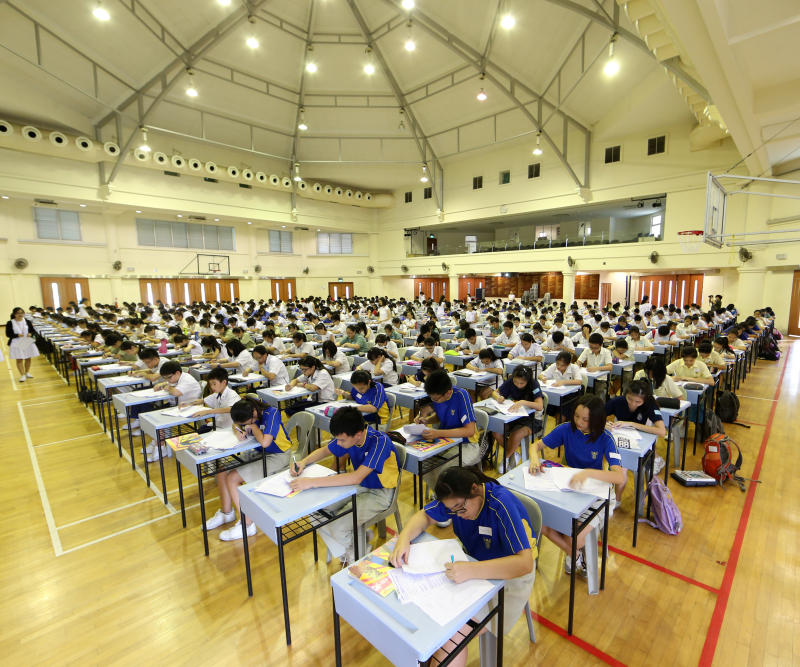Lionel wrote an eloquent piece in praise of the potential of recently announced changes to the secondary education system, to which I felt compelled to respond. It was a great piece of writing to read, but was, in my opinion, utterly unrealistic in its conclusions. At a dialogue last year, Deputy Prime Minister Tharman Shanmugaratnam emphasized the importance of ‘Keep[ing] the escalator [of social mobility] moving up’. It may be tempting to see this new switch to Subject-Based Banding (SBB) as part of the regular maintenance of the escalator of education, but to rephrase the words of the great educator Obi-Wan Kenobi, ‘This is not the escalator we’re looking for’.
A Permeable Cell Wall? Or Impermeable Membrane?
The crux of the matter is whether students will be able to take advantage of their strengths in one subject despite their weakness in others, and whether students can make improvements in subjects over time. Given limited timetable slots, schools must first cater to the majority of students, presumably those taking traditional subject combinations at largely the same level (i.e. all G2s, or all G3s). Students who want to take, for instance, one G1, two G2s, and one G3 subject might be faced with an unfavourable timetable or class allocation.
In my experience, for instance, even though the ‘A’ Levels allow for a wide range of subject combinations in theory, most of my peers converged on tried-and-tested combinations such as H/GELM (History/Geography, Economics, Literature, and Mathematics) or P/BCEM (Physics/Biology, Chemistry, Economics, and Mathematics) for the convenience. As a result, the technical possibility of customization and taking different subjects at different levels might not result in students utilizing this opportunity for very practical and legitimate reasons.
Furthermore, it is still unclear how students will move between the bands. Lionel’s suggestion that we use “teachers’ assessments of individual students, providing insight to the less tangible aspects of learning ability such as classroom participation, quality of discussions, intellectual agility, and the level of interest” sounds great as an abstract idea. In practice, it is a swift and true arrow in the back of the warriors of the teaching profession, who are already overworked. I am sure there will be teachers who, despite being overworked, go above and beyond the call of duty to push their students and recommend them for higher bands; but policy cannot be made and assessed based on the assumption that exceptional things can happen regularly, since they are, by definition, exceedingly rare.
Even if students do transition between bands, this may wind up being a trap that sets them up for failure. The omission of topics from lower-level variants of the same subject may present an obstacle too difficult to overcome. Perhaps for non-technical subjects such as History or Literature, the difference between bands may simply be the breadth of content (similar to how ‘A’ Level H1 History simply omits Southeast Asian History from the H2 syllabus). However, for other subjects that are cumulative in skills and content such as the Sciences and Mathematics, the omission of entire subject areas may not bode well for students who are expected to keep up once they make the move. A student who has not experienced Organic Chemistry before will struggle to pick it up and catch up with her or his peers. A ‘common foundation’ may not be possible for these subjects.
One River Hurtling into a Branching Delta
Education Minister Ong Ye Kung, in explaining the changes to the education system, mentioned that “We will no longer have… three separate streams, but… one broad river, each negotiating its own journey”. But make no mistake, every river must eventually meet a delta, and so it is the case even with SBB. Students will still need to be streamed at some point into Junior College, Polytechnic or ITE. Here, the details are even fuzzier, and it is difficult to assess SBB without knowing what it will lead to at the end of a student’s secondary school education. Whatever the new system looks like, it will probably be more complicated than the one that preceded it – such is the price of allowing customization upstream. The costs of such complexity are real, and will fall especially acutely on those who do not have the resources to ‘optimize’ their way through the system. We can only hope that the new form of L1R5 will take this into account.
“A little less conversation, a little more action, please…”
In addressing the G-30 seminar in Bali last October, DPM Tharman quoted the ‘late economist’ Elvis Presley, calling for more action beyond conversation. Lionel sees the switch to SBB as an opportunity for the government to take the lead in advocating for social change: a society less concerned with academic achievement as a filter of ability, and more accommodating of alternative pathways to success.
However, it seems fairly unlikely that the government will take the lead in advocating for social change, especially for non-economic issues. Recent debates over the budget, timing of CPF withdrawals, and whether to allow certain bands to perform seem to indicate that the government prioritizes the allocation of limited political capital on its economic agenda, rather than pushing for social change. Indeed, the long struggle towards getting marital rape recognized as a criminal offence suggests that the government often has to be nudged by civil society into confirming social change, rather than being an advocate for it.
Subscribe to our website: Get notifications when we publish new pieces
Like our SPJ Facebook page for updates on pieces and to see when we hold small group Discussions in Boston
In Boston? Like the SSEAF page for updates when we hold panels and events with distinguished academics and thinkers
Want to write? Submit an article to this email address
Interested in responding to one of our published pieces? We welcome Letters To The Editor
Image Credit: Business Insider
